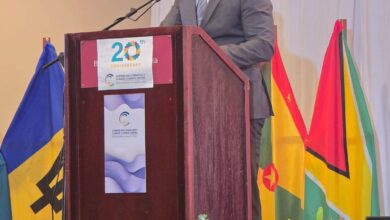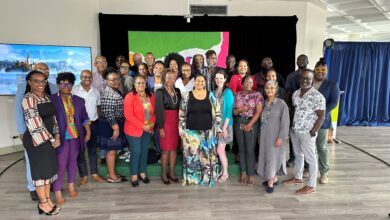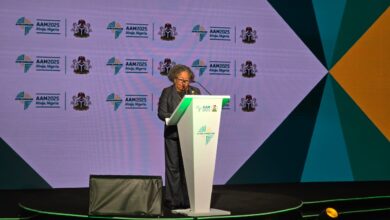Your Excellency, Dr. Sir Cuthbert Sebastian, Governor General,
Your Honour Mr. Eustace John and Mrs.John,
Members of Cabinet,
Honourable Secretary General, Mr. Edwin Carrington,
Distinguished Foreign Ministers of the Caribbean Community and Heads of Delegations,
Mr. Speaker, Hon. Walford Gumbs and other Members of the Legislature,
Members of the Diplomatic Corps,
Members of Delegations,
Ms. Dorethea Hector, Permanent Secretary and other public officers,
Members of the Press,
Distinguished Ladies and Gentlemen.
I extend a warm welcome to you and I hope that all of our overseas guests will take some time to enjoy what St. Kitts and Nevis has to offer. Our people are very pleased to have you here and you can expect that we shall do everything possible to make your visit a happy and comfortable one.
The Council for Foreign and Community Relations (COFCOR) is a relatively new institution which has evolved out of the revision of the treaty of Chaguaramas and its protocols. The first meeting of COFCOR was held in Paramaribo, Suriname a year ago. We deem it a historic occasion and are proud to host this conference and the first CARICOM Foreign Affairs meeting in St. Kitts in nearly 20 years.
This meeting takes place against a background of regional and international conflicts and challenges. The inferno in Kosovo, the cauldron in the Middle East and the hell that is Rwanda- Burundi have all underscored the importance of paying close attention to the issue of ethnic and racial differentiation. It can save a lot of lives in the process.
Our aim must be to hew to the principle of human dignity as the sine qua non for the resolution of international conflicts. Some will undoubtedly say that CARICOM’S commitment to the fundamental principles on which the United Nations Charter rests, represents naivete about how the world works. Some have even likened the re-statement of these principles as a mantra of the weak and they further characterize this position as ‘a morality of weakness’ akin to the underlings of whom Nietsche wrote with contempt.
Neitsche derided beatitudes such as “Blessed are the meek, for they shall inherit the earth” as implying nothing more than a glorification of weakness.
On the other hand, our critics applaud a realpolitik based solely on considerations of raw power, which uses principles in a cynical manner to suit its own purposes.
Banana Protocol
Permit me, ladies and gentlemen, to reflect for a moment on the issue of the Banana Protocol, within the framework of economic marginalisation of the developing countries of CARICOM as a result of globalisation and trade liberalisation.
We in Caricom have witnessed a disproportionate exercise of power in the matter involving the Banana Protocol, which allows the European Union to provide a guaranteed market for bananas exported from the Windward Islands.
It is an unimpeachable fact that the World Trade Organisation, supporting an application by the United States of America, has held that the terms of the Banana Protocol violate the rules of the WTO.
It is a consequential fact that the economies of our sister islands in the Windward are now imperilled in order to satisfy the demands of a banana producing company, owned by U.S. nationals. Thousands of Caribbean people have suffered and will continue to suffer as a result of this decision, while a tiny group of wilful fat barons stand to become even richer. In this regard, the United States disavows any untoward consequences of its action.
The U.S. claims that, by its action or lack thereof, it merely “continues to support a WTO- consistent Preference for Caribbean Banana exports to the European Union”.
To achieve progress in this obvious stalemate, we urge that the U.S. and Caribbean trade and political officials meet without further delay to refine their ideas as to how this WTO-consistent preference can be achieved with the affect of averting an economic and social crisis in the region.
The economies of small states pose unique problems and are especially vulnerable to changes in the global economy. The Government of St. Kitts and Nevis would like a Department to be established to address the economic problems of small island nation states. This Department would be a part of the Secretariat of the WTO and would provide input in the decision making process, to ensure that the perspective of small nation states is considered at all times.
On May 10, 1997 almost two years to this day, we, the leaders of the Caribbean, met with President Clinton, the Leader of the United States of America and the Free World, in Bridgetown, Barbados. We signed what is now known as the Bridgetown Accord.
The framework of the Accord recognised the need for the Caribbean and the United States to develop a Partnership for Prosperity and Security in the Caribbean. In this agreement, the Caribbean and the United States explicitly agreed to work with all concerned parties to achieve mutually satisfactory marketing arrangements for Caribbean bananas to the traditional markets of the European Union. We also recognised the inextricable link between trade, economic development, security and prosperity.
We are now being given the nearly impossible task of picking prosperity and security out of the ashes of economic and social destruction. We make an appeal to the United States to demonstrate to Caribbean governments and people that it has not departed from the mutually agreed principles of prosperity and security and to give more tangible and expressed support to the Windward Island economies and the economies of the Caribbean as a whole.
The Government of St. Kitts and Nevis believes that the U.S. and CARICOM can work together under the terms of the Partnership for Prosperity and Security to resolve the problems experienced by the Windward Islands following the W.T.O. decision. I would hope that this Conference begins to fashion the modalities to energise the partnership.
Immigration Issues
Distinguished Ladies and Gentlemen, I turn now to issues of United States Immigration policies. During the discussions at Bridgetown between the leaders of the Caribbean and the United States of America the issues surrounding the deportation of persons who are Caribbean citizens by birth or descent were aired. It was thought at the time that we had developed a mutually agreed framework to deal with the problems inherent in such a policy.
The way it has worked in practice is that thousands of criminals who have no link or cultural affinity to the region are being deported to the region and are transferring their criminal behaviour, which was learned in the United States, to communities where our security forces are incapable of containing their deviant conduct. The unilateral deportation of felons unleashes disruptive elements on small societies and has the unintended consequence of violating the understanding reached by CARICOM and the U.S. in Barbados in 1997.
A bedrock principle approved at the Barbados meeting was that all parties should so act as not to jeopardise each other’s national security. Globalisation has accelerated the internationalisation of crime. Criminal conspiracies exist that command greater resources than do many countries.
While the recent establishment of an International Criminal Court is a positive development, by itself it is an inadequate response to transnational criminals. St. Kitts and Nevis would hope that countries with the capacity to deal with international crime will join with small countries such as ours, that are victimised by international felons, to commission a study as to how to help small countries from being preyed upon by international criminals under colour of law.
We therefore strongly urge the United States to re-examine its deportation procedures with a view to eliminating the threat posed to the security and stability of CARICOM countries.
Travel Advisories
Another issue which bedevils U.S.-CARICOM relations relates to the publication of travel advisories. The publication of a travel advisory invariably brings in its train some degree of harm to the country against whom it is issued and can be potentially devastating to a small economy.
A U.S. Travel Advisory may discourage some U.S. citizens from traveling to a country like St. Kitts and Nevis at a particular time. The number may be minuscule in the context of the U.S. population, but in the context of the St. Kitts and Nevis tourism operation and its economy, it could be significant. We believe that a mechanism for consultation should be created. Such a mechanism would ensure that greater sensitivity is brought to bear in the publication of Travel Advisories and that the likely impact of such advisories will be given full consideration.
The Bridgetown Accord addressed the thorny problems related to the movement of drugs. Caricom countries, as signatories to the Accord, agreed to arrangements for the control and interdiction of drugs. Caricom countries also agreed to co-operate with friendly countries with respect to matters of security.
The United States, for its part, agreed to implement C.B.I. enhancement legislation which would facilitate competition by Caribbean producers with Mexican businesses. These main elements constituted an integral part of the Partnership for Prosperity and Security.
CARICOM Heads met in Paramaribo, Suriname last March and agreed that the present state of affairs warranted a reviewing of the Bridgetown Accord. To date, there has been no significant development arising out of the call by CARICOM Heads of Government for a review of the Bridgetown Accord. It is hoped therefore that this Conference will be the vehicle to expedite the attainment of such a review.
Greater Coordination of Foreign Policy
We in the Caribbean Community also need to pay greater attention to a more careful co-ordination and development of foreign policy activities.
I am sure that you must all be aware that under Protocol 1, Article 8, the Caricom Council for Foreign and Community Relations has been given the responsibility to develop, manage and implement foreign policy positions and to coordinate these policy positions for and on behalf of the Caribbean Community.
It must be absolutely clear to all of us that we in the Caribbean have not been doing a very good job at this coordination of foreign policy. Let us take for example the issue of candidates and their positioning for office in regional and international fora.
In May 1996, the Standing Committee of Ministers responsible for Foreign Affairs (SCMFA), now the COFCOR, agreed upon a mechanism to determine CARICOM candidatures and the procedure for the endorsement of Non-Caricom candidates. The mechanism for the determination of CARICOM candidatures and the election of our candidates to international positions have proved effective in many respects. We in St. Kitts and Nevis have benefitted from this mechanism and the coordination of policy which this reflects, through the election of two of our citizens in the last year to United Nations institutions.
Unfortunately, our foreign policy coordination in regard to providing effective support for the election of candidates through strategic voting has not met with the desired success. This lack of success has been due to the fact that the Caribbean has not been able to develop the solidarity and the consensus necessary for success in international fora. It is clear to me that we in the Caribbean have to make decisions which are not only in our individual national interest but which are also in the interest of the region.
On the agenda before us today and over the next few days will be issues critical to the develop-ment of a coordinated foreign policy and for the development of policies directly related to this issue of candidates. Over the next few months there will be many opportunities for Caribbean candidates and candidates with Caribbean consensus to achieve electoral success but this will only occur if we return to the basics of supporting candidates who will work in the interest of the region.
Other Agenda Issues
Distinguished Ladies and gentlemen, a perusal of the draft agenda before you will indicate that there is much work to be accomplished over the next day or two. I have already made mention of the need to review U.S-Caribbean relations and the need to develop a medium and long term strategy in respect of foreign policy coordination.
There are some other weighty issues which relate to the proposal to have the Caribbean Sea internationally recognised as a special area and the review of the progress being made in our international and bilateral negotiations. In this context we are expected to look in some detail at the status of the negotiations taking place between the EU and the ACP, the current situation of the WTO and the existing impasse as it relates to the election of a new Director General. In addition there are other trade and related matters which may or may not affect our position in regard to the Free Trade Area of the Americas.
Your Excellency, Ministerial colleagues, distinguished Ladies and Gentlemen, St. Kitts and Nevis has always played a historic role in the development of the economic and social policy of the Caribbean. We have always been in the forefront of change in the region. It is at Buckley’s Estate in the mid 1930’s that the social revolution which forged the new Caribbean began.
Since then, we in St. Kitts and Nevis, through the strength and vision of our leaders, have always maintained our place in the vanguard of visionary Caribbean leadership. None of us can forget or erase the sterling contribution to Caribbean unity of our National Hero, The Rt. Excellent Robert Llewellyn Bradshaw and his Second in Command the Hon. C.A. Paul Southwell. We cannot estimate or evaluate the contributions made by others in this country to the economic and social development of the Caribbean.
Today St. Kitts and Nevis stands on the threshold of a new era in which we will be called upon to take the leading position in COFCOR. We take this responsibility very seriously. I give you an undertaking in the name of the people of St. Kitts and Nevis that we will undertake this responsibility with all the energy and passion which is consistent with progressive Caribbean endeavours.
I therefore now accept the torch of leadership of this August body, the Council for Foreign and Community Relations . I take it with humility and pride from the leadership of Suriname whom, over the past year, have kept the torch ablaze and highlighted issues relevant to the further economic, social and political development of the Caribbean people. You may rest assured that St. Kitts and Nevis will take the process further.
I again welcome all visitors to the Federation and wish God’s Blessing on a successful conference.
I thank you.





